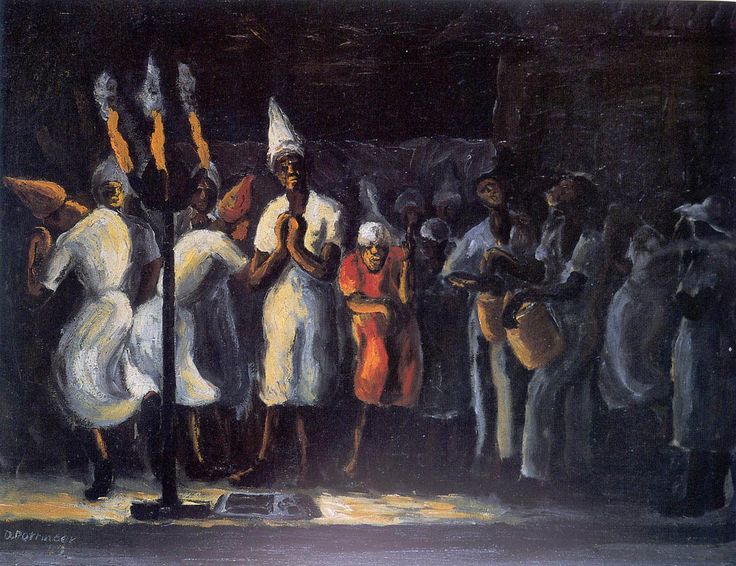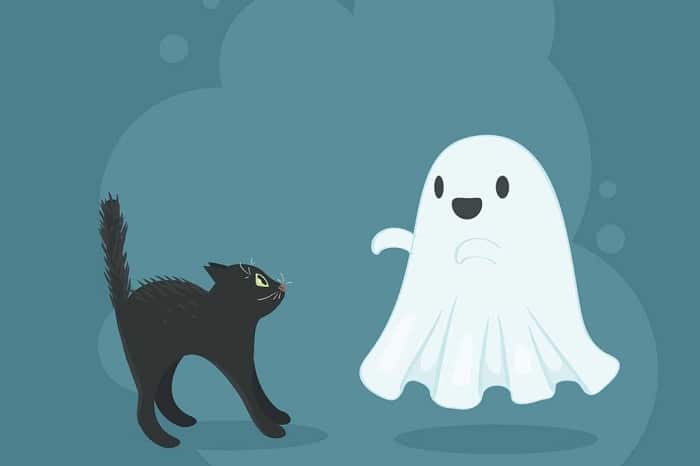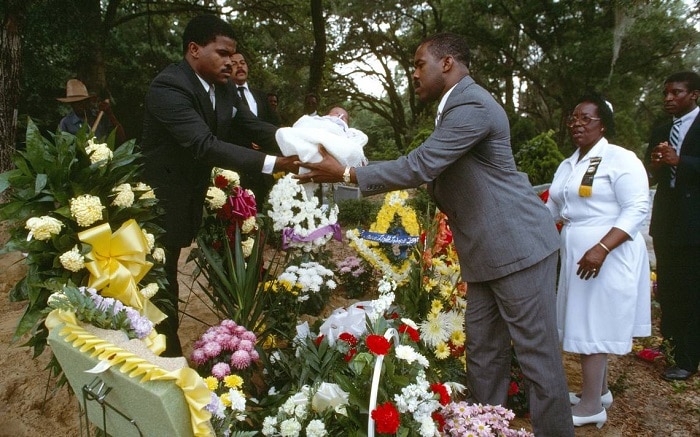3. Jamaicans and Death Rituals
To this day, many Jamaicans still believe that death is not the end. Indeed, Jamaicans go to great lengths to appease their deceased relatives’ spirits (aka “duppies”) with elaborate funerary rituals. Many Jamaicans have many fascinating beliefs and practices surrounding funerals that draw from both African folklore and British Protestantism. Look at some Jamaican funeral traditions many people living in rural Jamaica practice to this day.
We first can examine death rituals going back to slavery as a means of cultural preservation. Death rituals in Jamaica are part of European and African culture. These cultures are blended together with Christianity. Some of the burial rituals include having red and white floral color arrangements. Then there is covering all mirrors in the house and wearing black clothing. Other rituals include rearranging the furniture, so the ghost will not be familiar with the house. Taking the corpse out feet first from out the house.
African Custom and Traditions
These and other African customs such as passing a young child over the body a few times. This is suppose to prevent the spirit from causing any harm to the child are some of the practices. Some traditions focus on the death and the cause of death. The cause of death in particular was of utmost importance to the family left behind. This is true for any family across the globe when it comes to “How did he/she die”. What’s most unusual is where the tradition comes into play.
The family would add razors, knives, or money for the purpose of avenging witchcraft. If the Family believed the death was caused by witchcraft. The corpse could be given a broom tied in white cloth to keep the yard clean. It may be a horsewhip to kill the killer or for the spirit to ride with. Some tradition has it that the coffin gets heavier if the pallbearers stop in front of a house where a debt is owed or burying the dead in a particular place against their wishes.
3. Do Jamaicans still Practice Rituals
These African traditional rituals are still practiced in some parts of the island. However, as times change and the world becomes more westernized, many of the traditional Jamaican African Rituals are put into practice less and less. What stays consistent throughout the world is that death and burial have always been a way of bringing friends and family together.
The process of notifying family members and allowing them the time to come and pay their proper respect can take some time. For people to put their personal lives in order or on hold and make arrangements can take up to a month, sometimes even longer. What helps to make the waiting time achievable and more realistic today for families to get to the funeral weeks after the death, is the use of new and improved embalming fluid. These days, dead bodies are sometimes kept for up to a month and even longer and its today’s technology that makes it possible.
In addition to delaying the burials, the family’s financial status goes on display. Some families have elaborate gatherings that showcase their financial strength. Part of the cultural rituals which will be explained in detail later in this article, is the addition of a live band to the traditional funeral. It’s no longer just selected musical instruments mainly drums to go along with the eating and drinking celebration.
1. Nine Night: The Jamaican Wake

David Pottinger, Nine Night (1949)
Without a doubt, the most important day of all Jamaican funeral traditions is the Nine-Night ceremony. Sometimes called Dead Yard or a Set-Up, the Nine Night is what Westerners would consider a wake. Family and friends gather together to celebrate the deceased person’s life. During the gathering, they share many stories together. Some stories address the greater audience while others are isolated in smaller groups. Of course, these stories are supposed to be about the life and times of the deceased. Sure they are, but often times the stories usually reminisce about good and bad old times. The tradition has always been about the gathering, the storytelling, and the celebration of the deceased.
As the different faces arrive, many of the faces are people who haven’t been seen for years and maybe even decades. So, while some conversations will be catching up on old times, others will be storytelling just a stroll down memory lane. The storytelling entails scary duppy (ghost) stories. They are downright frightening, especially for younger children. Nine Night in Jamaica has always been a great celebration of life while paying pilgrimage to the journey of the spirit afterlife.
Of course, you cannot lose sight of the occasion, and that the main theme is all about the life and times of the dead. However, the rituals surrounding the funeral gathering take on a life of its own. These days in Jamaica, Nine Night has drifted far right from its traditional celebration. It has taken on the life of being a grand ole celebration. In the past, the African tradition was more in line with the playing of the drums.
3. Live Ban Plays at Nine Night
Today, Jamaican families are hiring live ban to come to Nine Night and play music. These bands come to the celebration not to play church hymns or Christian music as one would expect. The musician’s musical selections are everyday Reggae Music. Sure they may play a few religious music as the older generation would expect, but they’re playing Reggae & Dance hall Music and many people are Jammin. And even though it does come across as out of focus, it clearly has become a tradition at Nine Night in Jamaica.
Bands are hired to perform at funerals. Their approach to playing at a funeral is no different than getting hired to play at a dance party festival. They play the same assortment of Jamaican Reggae music. On the other hand, many of the local people expect the music. Meanwhile, older persons have grown used to the full-fledged music at funerals and in most cases, tolerate it but may believe there should be a separation in the music selection. The thinking is that feel-good music is always welcome, and some good old-fashioned Reggae seems to fit that bill. However, the dance hall music comes across as a bit much. People are laughing, dancing and just having a jolly good time then there is the chosen few people that just take the dancing too far.
3. Jamaicans Living Abroad
What seems to be a noticeable difference is with the Jamaican people living abroad. When they come to the island to attend a funeral, they are a little taken aback by some of the style of music playing at funerals. They are surprised yet amazed at how outlandish the celebration has become.
Certainly, the celebration was always meant for family, friends, and people in the community coming together. Now, there are total strangers attending just about all Nine Night, mixed in with the known crowd and enjoying the festivity.
3.Typically and traditionally at Nine Night
Typically and traditionally at the Nine Night celebration, you always expect to see dominos playing, curried goat with white rice and or cooked green banana, and drinking manish water (goat soup). The Jamaican of choice is always White Rum. People enjoying traditional Jamaican food is something everyone looks forward to.
As you might’ve already guessed, this ceremony takes place on the ninth night after a person has died. The reason Jamaicans wait till the ninth night has to do with an old belief that it takes nine days for an African slave’s duppy to safely return to Africa.
Usually, a Nine Night is held in the deceased person’s home and begins at 8 PM.
Persons say farewell to the departed person’s duppy by inviting ancestral spirits into the house, dancing, and singing Christian hymns. Some Jamaicans even set up a table for the dead person’s duppy with food and beverages. Jamaicans believe their relative’s spirit will be present at the table sharing in all the food and listening to the stories guests tell of his/her life.
2. Feet Forward, Sweep Behind
In Jamaican folklore, it’s believed to be good luck to sweep directly behind the deceased person’s body as s/he is being carried out of the home. Not only does this remove negative energies from around the person’s body, but it also helps the duppy make a clean break with the physical body. All bodies are traditionally carried out of the house feet first. There’s no clear reason why this feet-first tradition started.
3. Burial Ceremony
Jamaicans usually bury their deceased on the day after the Nine-Night wake. It’s common for family and friends to put food, rum, money, and other important trinkets inside the deceased’s casket. This helps them on the other side. If people believe the dead person was murdered or killed by witchcraft, then they could place knives, horsewhips, or razors in the casket to help the duppy establish justice.
Gravediggers often sprinkle white rum around the grave site to ward off any negative entities before lowering the coffin into the earth. While there’s still a slight taboo against cremation in rural Jamaica, a growing number of Jamaican families are choosing this option for their funeral service.
4. Confuse the Duppy by Re-Arranging the Furniture

Either before or during the Nine Night celebration, friends and family re-arrange the furniture and turn over the mattress in the deceased person’s home. This is supposed to signal to the duppy that it is no longer welcome around this house. Re-arranging the furniture is a gentle way to discourage spirits from sticking around their old houses for too long. People who don’t practice this custom run the risk of creating a haunted house.
In addition to re-arranging the furniture, many Jamaicans shut off all clocks, covered mirrors, and wore black clothing before the funeral procession.
5. Special Jamaican Symbols Related to Death
Every culture has its own unique symbols related to death and the afterlife, and Jamaica is no different. Probably the most popular omen of death in Jamaica is when moths fly inside the house. Another common sign of impending death is when a bird flies near a sick person’s window or is heard tweeting during the nighttime.
Two colors associated with death in Jamaican funeral traditions are red and white; that’s why many people put together red and white floral arrangements after their relatives has passed.
6. Don’t Forget the Red Underwear!
Women who lose their husbands are supposed to wear bright red underwear to bed every night until their man is buried. Widows who don’t have a pair of red underwear are advised to tie a tiny piece of red string around their waist every night. The red color supposedly discourages the man’s duppy from…well, you know…in the middle of the night. Hey, even spirits need loving, right?
7. Watch Your Fingers!
One of the most unique Jamaican funeral traditions has to do with pointing at new gravesites. Many Jamaican parents warn their children that pointing directly at a grave is bad luck; it could cause their index finger to break off. Luckily, there’s a simple remedy to overcome this curse: bite your index finger until it hurts.
8. Passing a Child Over the Deceased Body

After a person has died, a few Jamaicans believe holding up a child before a dead body three times will ward off unclean spirits. They also believe the innocence of the child helps the dead person’s duppy transition into the spiritual realms with greater ease. This is one of the rarer Jamaican funeral traditions, but a few people in rural areas still practice this ritual.
9. Burials During Colonial Times
Sadly, there are no surviving graveyards between the 17th and 18th centuries for anyone who wasn’t a slave owner in Jamaica. Usually, priests carried out burials immediately after a person died with very little to no ceremony at that time. Locals feared keeping the body around for too long would spread diseases. Modern scholars, however, believe slaves used crops in their plantations to commemorate friends and family who passed on.
A few historians also believe slaves used beans and peas to encourage a person’s duppy not to haunt the living and stray too far away from their native village.
Death Is Not the End for Jamaicans
Jamaican funeral traditions have an extremely rich and complex history. While 21st-century Jamaicans in modern cities like Kingston might not practice everything listed above, almost every Jamaican has been to a Nine-Night celebration in his/her life. Most Jamaicans still firmly believe in the reality of the afterlife and pay respect to those who’ve passed away.
State Funerals
In Jamaica, State Funeral has managed to stay consistent and not change with the times. During the period of mourning, the flag is flown at half-mast on all public buildings. The funeral ceremony is handled by the Jamaican Defense Force. The fallen dignitary gets a 19-gun salute with the rounds firing at one-minute intervals. The Prime Minister’s Office would advise all attendees of National Honors with medals and service decorations to wear their medals.

weird
This was very interesting and useful, thank you.
Very informative whilst I knew most there was a few that I never knew. Let’s not forget that many of the Jamaican diaspora, practice these traditions across the world in their communities.
Thanks for the reminders. I was helping a friend with her studies on Jamaican funeral rituals and didn’t want to be seen as making up things so the fact that most of what is written accords with what I remembered was quite reassuring.
I also wanted to check out placing needles and /razor blades in the bottom of the deceased feet to stop them, especially if they were likely to be ‘bad spirits’.